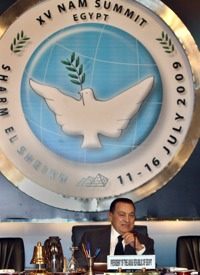
Al Jazeera reported that the theme of the two-day summit is "International Solidarity for Peace and Development." The group’s agenda document says the meetings "will focus on ways to reactivate Nam in the current world situation."
Founded in April 1955, with a stated goal of "neutrality" during the East-West Cold War of that era, the group’s founding leaders included extreme leftists and/or communists such as Jawaharlal Nehru of India, Kwame Nkrumah of Ghana, Gamal Abdel Nasser of Egypt, Achmed Sukarno of Indonesia, and Josip Broz Tito of Yugoslavia. The NAM is the world’s second-largest grouping of countries, second only to the United Nations.
The NAM follows a system of a rotating chair, an administrative position currently held by Cuba, which afforded Cuban President Raul Castro a prominent position at this summit.
Castro called for a new world financial order, stating, "The developing countries were the most affected by the financial crisis."
"Every country in the world must seek just solutions to the global economic crisis," said the Cuban leader, the brother of communist revolutionary Fidel Castro. "We call for a new monetary and economic world order.… We must restructure the world financial system to take into consideration the needs of developing countries." (Emphasis added.)
Reuters news also quoted from an Arabic translation of Castro’s speech, wherein he complained: "As usual, the wealthy countries were the source of the current crisis, which was affected by the … illogic of the international economic order that depends on blind market principles and consumption, and wealth of the few."
Similar sentiments were voiced by Egyptian President Hosni Mubarak, whose country succeeds to the chair of NAM after Cuba: "We call for a new international political, economic, and trade order — a more just and balanced order that prevents discrimination and double standards, achieves the interests of all, takes into account concerns of developing countries and establishes democratic dealings between rich and poor states." (Emphasis added.)
Addressing the NAM, Dominican Republic President Leonel Fernandez criticized the recent G-8 summit held in Italy, stating: "The nations of the G8 have committed $20 billion to address the issue of food security. This is not an adequate sum, much more needs to be done."
In fact, the G-8 leaders have pledged that "despite the severe impact of the [global financial] crisis on our economies, we reiterate the importance of fulfilling our commitments to increase aid made at [their summit in] Gleneagles [Scotland in 2005]."
The G-8 leaders promised to make the $25 billion increase "together with other donors," adding that the development assistance committee of the Organization of Economic Cooperation and Development has estimated that "the combined commitments of G8 and other donors would increase overall ODA [official development assistance] by around $50 billion a year by 2010 compared to 2004."
UN Secretary-General Ban Ki-moon also addressed the summit, blaming the plight of developing states partially on economic protectionism. "We must counter this trend. Truly free and fair trade is crucial to stimulating recovery and spurring growth," he said.
Castro’s call for "a new monetary and economic world order," Mubarak’s call for a "new international political, economic, and trade order," and Ban’s call for "truly free and fair trade" are hardly new proposals. They sound, not-so-coincidentally, much like the words of former Secretary of State Henry Kissinger, who once opined in a Los Angeles Times op-ed that the 1993 passage of NAFTA "will represent the most creative step toward a new world order taken by any group of countries since the end of the Cold War." NAFTA, he noted, "is not a conventional trade agreement, but the architecture of a new international system." (Emphasis added.)
The phrase "new world order" (or variations of it) has also popped up in other places, the most famous example in recent years being President George H. W. Bush’s September 11, 1990 televised speech on the developing Iraq situation to a joint session of Congress, when he declared: "Out of these troubled times, our fifth objective — a new world order — can emerge…. We are now in sight of a United Nations that performs as envisioned by its founders." (Emphasis added.)
There is little need for the leaders of the NAM nations to reinvent the wheel. If they really want a "new world order," the internationalists running "the wealthy countries" and bodies like the UN and the WTO will be more than happy to give them one.
Photo: AP Images



